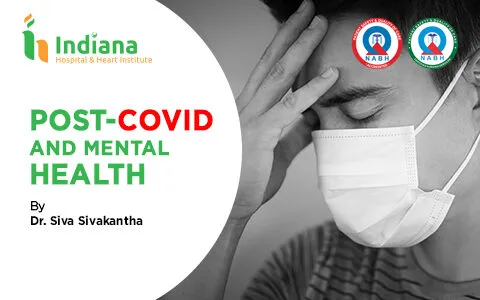Post Covid-19 and Mental Health By Dr. Siva Sivakantha
February 23, 2021
Overall what will be the impact of this pandemic on Mental Health? As treating physicians it is clear the current pandemic will have short and long term impact, not just on Physical Health but Mental Health too. As lungs are primarily affected by this Novel Virus any dysfunction will lead to impaired brain function. In general most of Mental Health issues we face today can be an immediate or long term consequence/complication of this deadly pandemic.

I will try addressing the immediate and long term Mental Health issues as we have seen and treated such patients up to now. Any person who is diagnosed with Covid can go through various emotional difficulties, in which common are panic, anxiety, fear, adjustment issues, grief and in few depression. These need to be diagnosed early (as in physical complications) so that it can be addressed effectively. Not addressing these issues can impact their overall treatment, hospital stay, co-morbidity, delayed recovery, inability to participate in rehabilitation, overall compliance with treatment and many others.
In the acute phase,when lungs are markedly affected, patients may develop Hypoxic brain dysfunction known as Encephalopathy (brain not getting adequate oxygen to function normally) leading to confusion, disorientation and inability to participate in their treatment. This needs immediate care to prevent further escalation. Elderly, patients with past history of stroke or other brain impairment, co-morbid medical issues (diabetes, kidney, liver problems, hypertension) are at higher risk to develop Delirium. Similar condition which can mimic Delirium is ICU psychosis. It is important to rule out medication side effects which may also attribute to such condition.
Many such Covid affected patients can also develop mood or emotional disability such as anxiety, panic, adjustment issues and grief. The mere fact that it is novel and pandemic can trigger such fear, apprehension, feeling overwhelmed or feeling helplessness/hopelessness. Further prolonged social isolation, being away from family, believing such information which are not true or lack facts, ICU stay, ventilation, witnessing more serious patients around, patients with prior history of anxiety/depression, patients who are currently in treatment for such emotional problems are those with higher risk to develop such condition.
Few patients can develop depression due to prolonged hospital stay, multiple complications, losing hope, financial/family burden, death of family member/friends due to Covid, lack of support network, lack of coping skills, unemployment, uncertainty about future, grief are few reasons among many to cause depression. There are few reports where individuals have committed suicide mostly because of panic, ignorance, stigma, mass /social hysteria, fake news, are just few to mention.
As physicians we also have come across many who are not affected, yet complaining of recent onset in anxiety/panic or even depression. Again individuals with prior history or at risk (like having family history or stress), currently in treatment can experience recurrence or worsening in their symptoms during these stressful times. Such patients are mostly preoccupied and overly concerned with irrational or uncontrollable worries.
Though less common compared to anxiety, depression, it is possible for few to develop Obsessive/Compulsive behaviours (fear of getting infected, excessive washing/cleaning), Phobias (distorted information, lacking facts can worsen) and other mood related issues. More this pandemic last these risks too will increase. Remember HIV and how people reacted hysterically until they were educated and gained insight.
There are many other issues which are less thought or discussed but can be of long term consequence. To mention a few, prolonged mandated home stay (especially among elderly and children), lack of social exposure, losing support systems, displacement (migrants), lack of schooling/learning, prolong exposure to digital/social media, increased substance use, domestic violence, impact on physical health, inactivity, long term economic impact, living with Covid as told by experts are factors which may impact both physical and emotional health. Even medication compliance among patients is poor during this period due to several restrictions, lack of access/availability.
Our recommendations are same as before to identify and treat such causes as we would have done otherwise. It is pertinent that we achieve this through public education, awareness, timely management, close monitoring and discussing with family/friends of the affected. Diagnosing early and treating co-morbid mental health issues immensely help with overall recovery and prognosis. A coordinated multidisciplinary approach will help treating such co-morbid mental health issues secondary to Covid Pandemic.
Dr. Siva Sivakantha, MBBS, MD (Psychiatry), Senior Consultant Psychiatrist
Indiana Hospital & Heart Institute Ltd, Mangaluru
